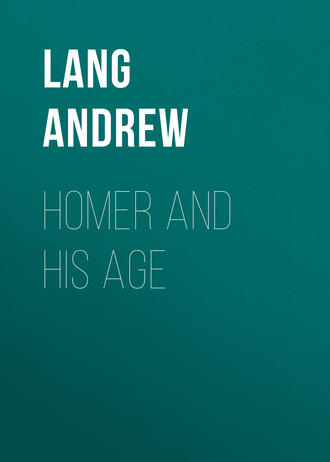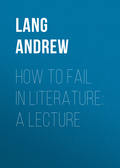
Lang Andrew
Homer and His Age
Thus we come, after all, to a crisis in which mere literary appreciation is the only test of the truth about a work of literature. The Odyssey is an admirable piece of artistic composition, or it is the very reverse. Blass, Mr. Leaf, Sir Richard Jebb, and the opinion of the ages declare that the composition is excellent. A crowd of German critics and Father Browne, S.J., hold that the composition is feeble. The criterion is the literary taste of each party to the dispute. Kirchhoff and Wilamowitz Möllendorff see a late bad patchwork, where Mr. Leaf, Sir Richard Jebb, Blass, Wolf, and the verdict of all mankind see a masterpiece of excellent construction. The world has judged: the Odyssey is a marvel of construction: therefore is not the work of a late botcher of disparate materials, but of a great early poet. Yet Sir Richard Jebb, while recognising the Odyssey as "an artistic whole" and an harmonious picture, and recognising Lönnrot's failure "to prove that mere combining and editing can form an artistic whole out of originally distinct songs, even though concerned with closely related themes," thinks that Kirchhoff has made the essence of his theory of late combination of distinct strata of poetical material from different sources and periods, in the Odyssey, "in the highest degree probable." {Footnote: Homer, p. 131.}
It is, of course, possible that Mr. Leaf, who has not edited the Odyssey, may now, in deference to his belief in the Pisistratean editor, have changed his opinion of the merits of the poem. If the Odyssey, like the Iliad, was, till about 540 B.C., a chaos of lays of all ages, variously known in various répertoires of the rhapsodists, and patched up by the Pisistratean editor, then of two things one – either Mr. Leaf abides by his enthusiastic belief in the excellency of the composition, or he does not. If he does still believe that the composition of the Odyssey is a masterpiece, then the Pisistratean editor was a great master of construction. If he now, on the other hand, agrees with Wilamowitz Möllendorff that the Odyssey is cobbler's work, then his literary opinions are unstable.
CHAPTER XVI
HOMER AND THE FRENCH MEDIAEVAL EPICS
Sir Richard Jebb remarks, with truth, that "before any definite solution of the Homeric problem could derive scientific support from such analogies" (with epics of other peoples), "it would be necessary to show that the particular conditions under which the Homeric poems appear in early Greece had been reproduced with sufficient closeness elsewhere." {Footnote: Homer, pp. 131, 132.} Now we can show that the particular conditions under which the Homeric poems confessedly arose were "reproduced with sufficient closeness elsewhere," except that no really great poet was elsewhere present.
This occurred among the Germanic aristocracy, "the Franks of France," in the eleventh, twelfth, and early thirteenth centuries of our era. The closeness of the whole parallel, allowing for the admitted absence in France of a very great and truly artistic poet, is astonishing.
We have first, in France, answering to the Achaean aristocracy, the Frankish noblesse of warriors dwelling in princely courts and strong castles, dominating an older population, owing a practically doubtful fealty to an Over-Lord, the King, passing their days in the chace, in private war, or in revolt against the Over-Lord, and, for all literary entertainment, depending on the recitations of epic poems by jongleurs, who in some cases are of gentle birth, and are the authors of the poems which they recite.
"This national poetry," says M. Gaston Paris, "was born and mainly developed among the warlike class, princes, lords, and their courts… At first, no doubt, some of these men of the sword themselves composed and chanted lays" (like Achilles), "but soon there arose a special class of poets … They went from court to court, from castle … Later, when the townsfolk began to be interested in their chants, they sank a degree, and took their stand in public open places …" {Footnote: Literature Française au Moyen Age, pp. 36, 37. 1898.}
In the Iliad we hear of no minstrels in camp: in the Odyssey a prince has a minstrel among his retainers – Demodocus, at the court of Phaeacia; Phemius, in the house of Odysseus. In Ionia, when princes had passed away, rhapsodists recited for gain in marketplaces and at fairs. The parallel with France is so far complete.
The French national epics, like those of the Achaeans, deal mainly with legends of a long past legendary age. To the French authors the greatness and the fortunes of the Emperor Charles and other heroic heads of great Houses provide a theme. The topics of song are his wars, and the prowess and the quarrels of his peers with the Emperor and among themselves. These are seen magnified through a mist of legend; Saracens are substituted for Gascon foes, and the great Charles, so nobly venerable a figure in the oldest French epic (the Chanson de Roland, circ. 1050-1070 in its earliest extant form), is more degraded, in the later epics, than Agamemnon himself. The "machinery" of the gods in Homer is replaced by the machinery of angels, but the machinery of dreams is in vogue, as in the Iliad and Odyssey. The sources are traditional and legendary.
We know that brief early lays of Charles and other heroes had existed, and they may have been familiar to the French epic poets, but they were not merely patched into the epics. The form of verse is not ballad-like, but a series of laisses of decasyllabic lines, each laisse presenting one assonance, not rhyme. As time went on, rhyme and Alexandrine lines were introduced, and the old epics were expanded, altered, condensed, remaniés, with progressive changes in taste, metre, language, manners, and ways of life.
Finally, an age of Cyclic poems began; authors took new characters, whom they attached by false genealogies to the older heroes, and they chanted the adventures of the sons of the former heroes, like the Cyclic poet who sang of the son of Odysseus by Circe. All these conditions are undeniably "true parallels" to "the conditions under which the Homeric poems appeared." The only obvious point of difference vanishes if we admit, with Sir Richard Jebb and M. Salomon Reinach, the possibility of the existence of written texts in the Greece of the early iron age.
We do not mean texts prepared for a reading public. In France such a public, demanding texts for reading, did not arise till the decadence of the epic. The oldest French texts of their epics are small volumes, each page containing some thirty lines in one column. Such volumes were carried about by the jongleurs, who chanted their own or other men's verses. They were not in the hands of readers. {Footnote: Épopées Françaises, Léon Gautier, vol. i. pp. 226-228. 1878.}
An example of an author-reciter, Jendeus de Brie (he was the maker of the first version of the Bataille Loquifer, twelfth century) is instructive. Of Jendeus de Brie it is said that "he wrote the poem, kept it very carefully, taught it to no man, made much gain out of it in Sicily where he sojourned, and left it to his son when he died." Similar statements are made in Renaus de Montauban (the existing late version is of the thirteenth century) about Huon de Villeneuve, who would not part with his poem for horses or furs, or for any price, and about other poets. {Footnote: Épopées Françaises, Léon Gautier, vol. i. p. 215, Note I.}
These early jongleurs were men of position and distinction; their theme was the gestes of princes; they were not under the ban with which the Church pursued vulgar strollers, men like the Greek rhapsodists. Pindar's story that Homer wrote the Cypria {Footnote: Pindari Opera, vol. iii. p. 654. Boeckh.} and gave the copy, as the dowry of his daughter, to Stasinus who married her, could only have arisen in Greece in circumstances exactly like those of Jendeus de Brie. Jendeus lived on his poem by reciting it, and left it to his son when he died. The story of Homer and Stasinus could only have been invented in an age when the possession of the solitary text of a poem was a source of maintenance to the poet. This condition of things could not exist, either when there were no written texts or when such texts were multiplied to serve the wants of a reading public.
Again, a poet in the fortunate position of Jendeus would not teach his Epic in a "school" of reciters unless he were extremely well paid. In later years, after his death, his poem came, through copies good or bad, into circulation.
Late, in the fourteenth and fifteenth centuries, we hear of a "school" of jongleurs at Beauvais. In Lent they might not ply their profession, so they gathered at Beauvais, where they could learn cantilenae, new lays. {Footnote: Épopées Françaises, Léon Gautier, vol. ii. pp. 174, 175.} But by that time the epic was decadent and dying?
The audiences of the jongleurs, too, were no longer, by that time, what they had been. The rich and great, now, had library copies of the epics; not small jongleurs' copies, but folios, richly illuminated and bound, with two or three columns of matter on each page. {Footnote: Ibid., vol. i. p. 228. See, too, photographs of an illuminated, double-columned library copy in La Chancun de Willame., London, 1903.}
The age of recitations from a text in princely halls was ending or ended; the age of a reading public was begun. The earlier condition of the jongleur who was his own poet, and carefully guarded his copyright in spite of all temptations to permit the copying of his MS., is regarded by Sir Richard Jebb as quite a possible feature of early Greece. He thinks that there was "no wide circulation of writings by numerous copies for a reading public" before the end of the fifth century B.C. As Greek mercenaries could write, and write well, in the seventh to sixth centuries, I incline to think that there may then, and earlier, have been a reading public. However, long before that a man might commit his poems to writing. "Wolf allows that some men did, as early at least as 776 B.C. The verses might never be read by anybody except himself" (the author) "or those to whom he privately bequeathed them" (as Jendeus de Brie bequeathed his poem to his son), "but his end would have been gained." {Footnote: Homer, p. 113.}
Recent discoveries as to the very early date of linear non-Phoenician writing in Crete of course increase the probability of this opinion, which is corroborated by the story of the Cypria, given as a dowry with the author's daughter. Thus "the particular conditions under which the Homeric poems appeared" "been reproduced with sufficient closeness" in every respect, with surprising closeness, in the France of the eleventh to thirteenth centuries. The social conditions are the same; the legendary materials are of identical character; the method of publication by recitation is identical; the cyclic decadence occurs in both cases, the monomanie cyclique. In the Greece of Homer we have the four necessary conditions of the epic, as found by M. Léon Gautier in mediaeval France. We have: —
(1) An uncritical age confusing history by legend.
(2) We have a national milieu with religious uniformity.
(3) We have poems dealing with —
"Old unhappy far-off things
And battles long ago."
(4) We have representative heroes, the Over-Lord, and his peers or paladins. {Footnote: Épopées Françaises, Léon Gautier, vol. i. pp. 6-9}
It may be added that in Greece, as in France, some poets adapt into the adventures of their heroes world-old Märchen, as in the Odyssey, and in the cycle of the parents of Charles.
In the French, as in the Greek epics, we have such early traits of poetry as the textual repetition of speeches, and the recurring epithets, "swift-footed Achilles," "Charles of the white beard," "blameless heroes" (however blamable). Ladies, however old, are always "of the clear face." Thus the technical manners of the French and Greek epics are closely parallel; they only differ in the exquisite art of Homer, to which no approach is made by the French poets.
The French authors of epic, even more than Homer, abound in episodes much more distracting than those of the Iliad. Of blood and wounds, of course, both the French and the Greek are profuse: they were writing for men of the sword, not for modern critics. Indeed, the battle pieces of France almost translate those of Homer. The Achaean "does on his goodly corslet"; the French knight "sur ses espalles son halberc li colad." The Achaean, with his great sword, shears off an arm at the shoulder. The French knight —
"Trenchad le braz, Parmi leschine sun grant espee li passe."
The huge shield of Aias becomes cele grant targe duble in France, and the warriors boast over their slain in France, as in the Iliad. In France, as in Greece, a favourite epic theme was "The Wrath" of a hero, of Achilles, of Roland, of Ganelon, of Odysseus and Achilles wrangling at a feast to the joy of Agamemnon, "glad that the bravest of his peers were at strife." {Footnote: Odyssey, VIII. 75-7s {sic}.}
Of all the many parallels between the Greek and French epics, the most extraordinary is the coincidence between Charles with his peers and Agamemnon with his princes. The same historical conditions occurred, at an interval of more than two thousand years. Agamemnon is the Bretwalda, the Over-Lord, as Mr. Freeman used to say, of the Achaeans: he is the suzerain. Charles in the French epics holds the same position, but the French poets regard him in different lights. In the earliest epic, the Chanson de Roland, a divinity doth hedge the famous Emperor, whom Jeanne d'Arc styled "St. Charlemagne." He was, in fact, a man of thirty-seven at the date of the disaster of Roncesvaux, where Roland fell (778 A.D.). But in the tradition that has reached the poet of the chanson he is a white-bearded warrior, as vigorous as he is venerable. As he rules by advice of his council, he bids them deliberate on the proposals of the Paynim King, Marsile – to accept or refuse them. Roland, the counterpart of Achilles in all respects (Oliver is his Patroclus), is for refusing: Ganelon appears to have the rest with him when he speaks in favour of peace and return to France out of Spain. So, in the Iliad (II.), the Achaeans lend a ready ear to Agamemnon when he proposes the abandonment of the siege of Troy. Each host, French and Achaean, is heartily homesick.
Ganelon's advice prevailing, it is necessary to send an envoy to the Saracen court. It is a dangerous mission; other envoys have been sent and been murdered. The Peers, however, volunteer, beginning with the aged Naismes, the Nestor of the Franks. His offer is not accepted, nor are those of Oliver, Roland, and Turpin. Roland then proposes that Ganelon shall be sent; and hence arises the Wrath of Ganelon, which was the ruin of Roland and the peers who stood by him. The warriors attack each other in speeches of Homeric fury. Charles preserves his dignity, and Ganelon departs on his mission. He deliberately sells himself, and seals the fate of the peers whom he detests: the surprise of the rearguard under Roland, the deadly battle, and the revenge of Charles make up the rest of the poem. Not even in victory is Charles allowed repose; the trumpet again summons him to war. He is of those whom Heaven has called to endless combat —
"Their whole lives long to be winding
Skeins of grievous wars, till every soul of them perish,"
in the words of Diomede.
Such is the picture of the imperial Charles in one of the oldest of the French epics. The heart of the poet is with the aged, but unbroken and truly imperial, figure of St. Charlemagne – wise, just, and brave, a true "shepherd of the people," regarded as the conqueror of all the known kingdoms of the world. He is, among his fierce paladins, like "the conscience of a knight among his warring members." "The greatness of Charlemagne has entered even into his name;" but as time went on and the feudal princes began the long struggle against the French king, the poets gratified their patrons by degrading the character of the Emperor. They created a second type of Charles, and it is the second type that on the whole most resembles the Agamemnon of the Iliad.
We ask why the widely ruling lord of golden Mycenae is so skilfully and persistently represented as respectable, indeed, by reason of his office, but detestable, on the whole, in character?
The answer is that just as the second type of Charles is the result of feudal jealousies of the king, so the character of Agamemnon reflects the princely hatreds of what we may call the feudal age of Greece. The masterly portrait of Agamemnon could only have been designed to win the sympathies of feudal listeners, princes with an Over-Lord whom they cannot repudiate, for whose office they have a traditional reverence, but whose power they submit to with no good will, and whose person and character some of them can barely tolerate.
{blank space} an historical unity. The poem deals with what may be called a feudal society, and the attitudes of the Achaean Bretwalda and of his peers are, from beginning to end of the Iliad and in every Book of it, those of the peers and king in the later Chansonsde Geste.
Returning to the decadent Charles of the French epics, we lay no stress on the story of his incest with his sister, Gilain, "whence sprang Roland." The House of Thyestes, whence Agamemnon sprang, is marked by even blacker legends. The scandal is mythical, like the same scandal about the King Arthur, who in romance is so much inferior to his knights, a reflection of feudal jealousies and hatreds. In places the reproaches hurled by the peers at Charles read like paraphrases of those which the Achaean princes cast at Agamemnon. Even Naismes, the Nestor of the French epics, cries: "It is for you that we have left our lands and fiefs, our fair wives and our children … But, by the Apostle to whom they pray in Rome, were it not that we should be guilty before God we would go back to sweet France, and thin would be your host." {Footnote: Chevalerie Ogier, 1510-1529. Épopées Françaises, Léon Gautier, vol. iii. pp. 156-157.} In the lines quoted we seem to hear the voice of the angered Achilles: "We came not hither in our own quarrel, thou shameless one, but to please thee! But now go I back to Phthia with my ships – the better part." {Footnote: Iliad, I. 158-169.}
Agamemnon answers that Zeus is on his side, just as even the angry Naismes admits that duty to God demands obedience to Charles. There cannot be parallels more close and true than these, between poems born at a distance from each other of more than two thousand years, but born in similar historical conditions.
In Guide Bourgogne, a poem of the twelfth century, Ogier cries, "They say that Charlemagne is the conqueror of kingdoms: they lie, it is Roland who conquers them with Oliver, Naismes of the long beard, and myself. As to Charles, he eats." Compare Achilles to Agamemnon, "Thou, heavy with wine, with dog's eyes and heart of deer, never hast thou dared to arm thee for war with the host …" {Footnote: Iliad, I. 227, 228. Gui de Bourgogne, pp. 37-41.} It is Achilles or Roland who stakes his life in war and captures cities; it is Agamemnon or Charles who camps by the wine. Charles, in the Chanson de Saisnes, abases himself before Herapois, even more abjectly than Agamemnon in his offer of atonement to Achilles. {Footnote: Épopées Françaises, Léon Gautier, vol. iii. p. 158.} Charles is as arrogant as Agamemnon: he strikes Roland with his glove, for an uncommanded victory, and then he loses heart and weeps as copiously as the penitent Agamemnon often does when he rues his arrogance. {Footnote: Entrée en Espagne.}
The poet of the Iliad is a great and sober artist. He does not make Agamemnon endure the lowest disgraces which the latest French epic poets heap on Charles. But we see how close is the parallel between Agamemnon and the Charles of the decadent type. Both characters are reflections of feudal jealousy of the Over-Lord; both reflect real antique historical conditions, and these were the conditions of the Achaeans in Europe, not of the Ionians in Asia.
The treatment of Agamemnon's character is harmonious throughout. It is not as if in "the original poem" Agamemnon were revered like St. Charlemagne in the Chanson de Roland, and in the "later" parts of the Iliad were reduced to the contemptible estate of the Charles of the decadent Chanson de Geste. In the Iliad Agamemnon's character is consistently presented from beginning to end, presented, I think, as it could only be by a great poet of the feudal Achaean society in Europe. The Ionians – "democratic to the core," says Mr. Leaf – would either have taken no interest in the figure of the Over-Lord, or would have utterly degraded him below the level of the Charles of the latest Chansons. Or the late rhapsodists, in their irresponsible lays, would have presented a wavering and worthless portrait.
The conditions under which the Chansons arose were truly parallel to the conditions under which the Homeric poems arose, and the poems, French and Achaean, are also true parallels, except in genius. The French have no Homer: cared vate sacro. It follows that a Homer was necessary to the evolution of the Greek epics.
It may, perhaps, be replied to this argument that our Iliad is only a very late remaniement, like the fourteenth century Chansons de Geste, of something much earlier and nobler. But in France, in the age of remaniement, even the versification had changed from assonance to rhyme, from the decasyllabic line to the Alexandrine in the decadence, while a plentiful lack of seriousness and a love of purely fanciful adventures in fairyland take the place of the austere spirit of war. Ladies "in a coming on humour" abound, and Charles is involved with his Paladins in gauloiseries of a Rabelaisian cast. The French language has become a new thing through and through, and manners and weapons are of a new sort; but the high seriousness of the Iliad is maintained throughout, except in the burlesque battle of the gods: the versification is the stately hexameter, linguistic alterations are present, extant, but inconspicuous. That the armour and weapons are uniform in character throughout we have tried to prove, while the state of society and of religion is certainly throughout harmonious. Our parallel, then, between the French and the Greek national epics appears as perfect as such a thing can be, surprisingly perfect, while the great point of difference in degree of art is accounted for by the existence of an Achaean poet of supreme genius. Not such, certainly, were the composers of the Cyclic poems, men contemporary with the supposed later poets of the Iliad.





